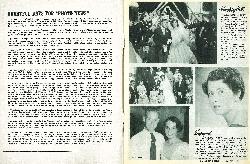2
Doubtful Days For "Photo News"
It will be a shock to many readers, as it was to "Photo News", to find that as a result of the recently-introduced import restrictions, the existence of this magazine is seriously threatened. As this issue goes to press, the position still remains that unless relief is given soon, the next issue of "Photo News" will be the last.
We have every expectation, however, that our efforts to secure sufficient supplies will ultimately be successful, and it is possible that word to this effect may have been received before the present issue is on sale.
Needless to say, we found this setback particularly ironic at a time when, after many years of pioneering work in a publishing field entirely of our own creation, "Photo News" had succeeded in establishing itself on a sound footing, with circulations approaching the 6000 mark in both Gisborne and New Plymouth.
Initially we were not worried about the effect of the restrictions on "Photo News". It was understood that materials for industry would not be affected, and the obvious need for locally-produced consumer goods to offset the deficiency in imported products was thought to be a safeguard. In any case we found, on making investigations, that we were assured by our suppliers of sufficient paper, plates, ink, and other materials. Only one small item, amounting to one-twelfth of our total requirements, appeared to be in danger. This was the sheet film used in the production of screened negatives from which our printing plates are made.
As the situation crystallised in respect of this item, which is supplied on a monthly basis by Kodak (N.Z.) Ltd., it became apparent that "Photo News" was in trouble. Because our business had doubled in 1957, the restriction to 50% of 1956 quantities was in effect a 75% cut. Kodak kindly made all our 1958 allocation available immediately, to keep us alive for three months while we made application to the Customs Department for relief.
The first of these applications was declined without explanation. Following a statement from the Minister of Customs, Mr R. Boord, that the department would accept special applications in cases of urgency, a further appeal was made. Meantime, a special case was prepared, and through the good offices of Mr R. A. Keeling, Member for the District, was presented to the Minister of Finance, Mr A. H. Nordmeyer, who was visiting Gisborne at the time. Approaches were also made on our behalf directly to the Ministries of Customs and Industries and Commerce by the president of the Gisborne Chamber of Commerce, Mr H. J. Howard. A much-appreciated offer of Australian currency to cover our needs (the film concerned is manufactured in Australia) was made by the Mayor, Mr H. H. Barker, but on initial inquiry this did not appear to be a solution.. Publicity was given to our case by the "Taranaki Herald", which led to some concern among subscribers of "New Plymouth Photo News".
Speaking to the council of the Auckland Manufacturers' Association last week, Mr Boord said the Government would spare no effort to ensure that manufacturers get all the raw materials they need to meet the gap in consumer goods caused by import restrictions. He also invited manufacturers, in cases of extreme urgency, to communicate with him direct.
Accordingly, we telegraphed Mr Boord, and received an immediate reply from him stating that the position in regard to "sensitised surfaces" (under which category the film in question is imported) was "receiving urgent consideration" and that a decision would be conveyed "as soon as possible".
And there, for the moment, the case rests. We have explained matters fully because we feel that the majority of our readers, as subscribers in the proper sense of the word, are entitled to know the position, and also so that fact might take the place of rumour as to the fate of "Photo News". As mentioned, we have every confidence that the situation will be righted, and that our case is merely an instance of our being caught up in a general import cut from which the anomalies will be rectified in due course.



